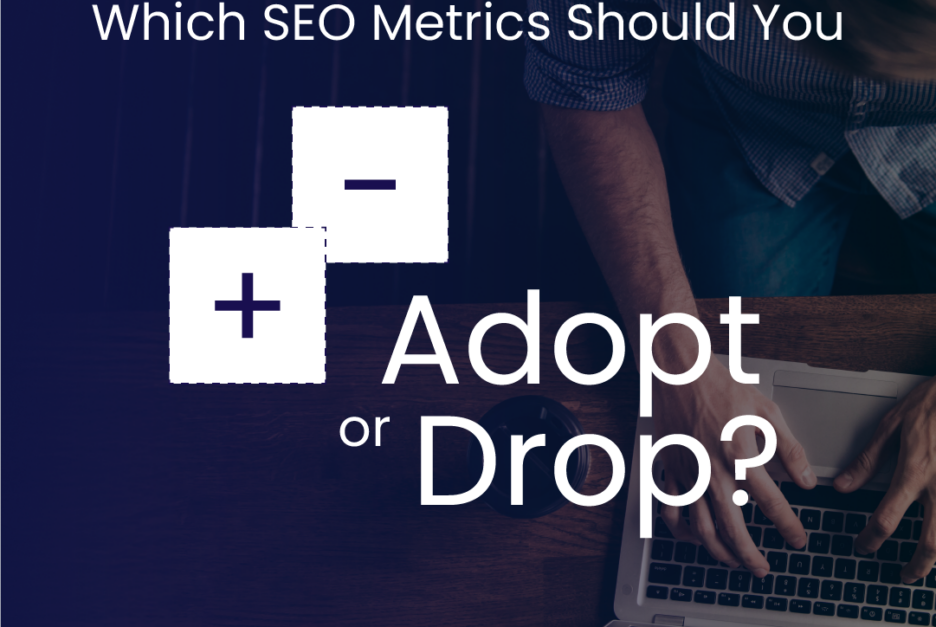I’m going to make a statement that may sound audacious coming from an SEO fanatic: It’s time to kick keyword rankings to the curb as a key performance indicator (KPI).
I don’t mean to say you should not pay attention to the keywords you’re showing up for in search. Of course you should! But looking at your total quantity of rankings is not a particularly informative practice on its own. And there are plenty of other standardized SEO metrics that we should all be scrutinizing for relevance.
In our recent webinar, SEO Glow-Up: Web Growth Tactics to Start and Stop in 2025, Jane Bartel and I spent some time zeroing in on measurement tactics that marketers should adopt or drop in the coming year. Drawing from that segment of the show, let’s dig into some of the key SEO metrics we covered in more detail to help you elevate your strategy in a transformed digital marketing landscape.
3 SEO metrics to drop in 2025
1. Quantity of keyword rankings
This SEO metric refers to the total number of keywords for which a website appears in search engine results pages (SERPs).
This is a common core metric in SEO strategies, used to demonstrate the breadth of a brand’s visibility in search, and it’s been central to many of our programs in the past. We still frequently report on it, but over time we’ve deprioritized it as a primary indicator of SEO health.
The problem with keyword rankings as a KPI is that it doesn’t tell you enough without significantly more context. Showing up on more SERPs is good, in theory, but which SERPs are we talking about? How relevant are the keywords to your buyer’s journey, and how many clicks are you winning with your ranking content? What kind of engagement are you driving?
Moreover, a growing number of practical challenges are involved with tracking keyword rankings accurately and meaningfully. Measurement methods are becoming unreliable due to:
- Personalized search results
- Location-based variations
- Device-specific differences
- Complexity of modern search queries (i.e. voice and semantic search)
Having said this, keyword rankings are usually worth tracking, but merely as a detail contributing to the full picture of your SEO performance.
2. Per-page performance
One trap that marketers can understandably fall into is getting overly fixated on their best-performing pages, and trying endlessly to replicate that success. As a result, they fail to create content that is diverse, unique and comprehensive.
It’s important to think of your content as an ecosystem, with every component playing its own role. Of course we all love the heavy hitters that drive big numbers, but they are often being elevated by the content that surrounds them and provides depth to your topical coverage. Not all of those are going to bring in a bunch of traffic or conversions, but that doesn’t mean they aren’t playing a key role in your overall performance, which is what matters.
3. Organic traffic
This sounds potentially absurd, I know. Isn’t driving organic traffic the point of SEO? Well, no. The point of SEO is ultimately to drive ROI and revenue. Bringing more traffic to your site via search can certainly support that goal, but as with keyword rankings, measuring organic traffic on its own lacks important context. Not all visitors are created equal.
I’ve seen many websites (our own included) with pages that persistently drive very high traffic from search but offer minimal business impact. Maybe the page happened to incidentally rank for a high-volume keyword. Maybe the topic is related to your industry but not relevant to your buyers. Maybe seasonal trends are driving big spikes.
There’s a lot of noise involved in organic traffic at a high level. Furthermore, websites across the web are seeing declines in this metric – as a result of forces outside their control – so fixating on it can generate a lot of undue stress and concern.
In 2025, marketers should lean into quality over quantity of organic traffic. The next three metrics will help you do so.
SEO metrics to adopt in 2025
1. Key Events
Google Analytics relabeled conversions as key events in GA4, to help iron out discrepancies with their Google Ads platform. We like this shift in verbiage because it broadens the scope of what is considered a “conversion” — zooming out from more traditional, commercial actions (filling out a form, signing up for a demo, scheduling a call) to whatever actions a business deems valuable on a particular page. This might include joining a group, signing up for a newsletter, or clicking through to a service page.
Tracking key events is highly valuable, because it sophisticates your performance measurement and helps marketing align with the C-suite on impact. Define your key events thoughtfully and measure them consistently in 2025.
2. Clicks from search
One factor contributing strongly to the pervasive decline in organic web traffic for publishers is the continuing rise of the zero-click search — instances where a user’s query is answered directly on the SERP without needing to click on any link, typically through features like featured snippets, knowledge panels, or AI Overviews.
This ties back to the limitations of keyword rankings as a metric; what if your site is showing up on a bunch of SERPs that aren’t driving clicks, because the query is concisely answered by an AI snapshot? There’s brand awareness value in showing up here, but obviously, the goal is bringing the right people to your site.
That’s why clicks to search, which simply measures the number of times users clicked through to your site from SERPs, is increasingly important to keep an eye on. When specific pages and keywords are performing highly, it’s an indication that the topic or the content is attracting people to your brand versus snippets, AI snapshots or competing links. Analyze and learn from these successes.
3. Organic conversion rate
How often are the people who arrive at your site via organic search completing the actions that you want them to? It’s a simple yet vital question, answered by organic conversion rate. Take this metric and compare it to your website’s overall conversion rate from all sources; if organic is higher, then that is a sign your SEO strategy is working.
- Learn more on our blog: What to Look For in an SEO Analysis of a Website
Update your SEO metrics to match the moment
It’s an undeniable reality: the total supply of organic search clicks out there for brands is diminishing, as AI and evolving search behaviors take hold. Instead of fretting about their quantitative losses in traffic or rankings, marketers should double down their focus on quality — ensuring the organic visitors they do bring in from search are qualified and valuable.
If you’re creating the right content, targeting the right intent and providing the right experience with your SEO content, then metrics like key events, clicks from search and organic conversion rate will tell the story. In the end, so will your revenue.
These metrics only scratch the surface of our broader exploration of keep-or-drop tactics in the SEO Glow-Up webinar. Register now to watch the whole thing on-demand.

Actionable Tip:
Hot take: It’s time to stop treating quantity of keyword rankings or even total organic traffic as standalone metrics for SEO success. Shifting to more qualitative measurement approaches will give you much more meaningful insight on your brand’s success in search.



